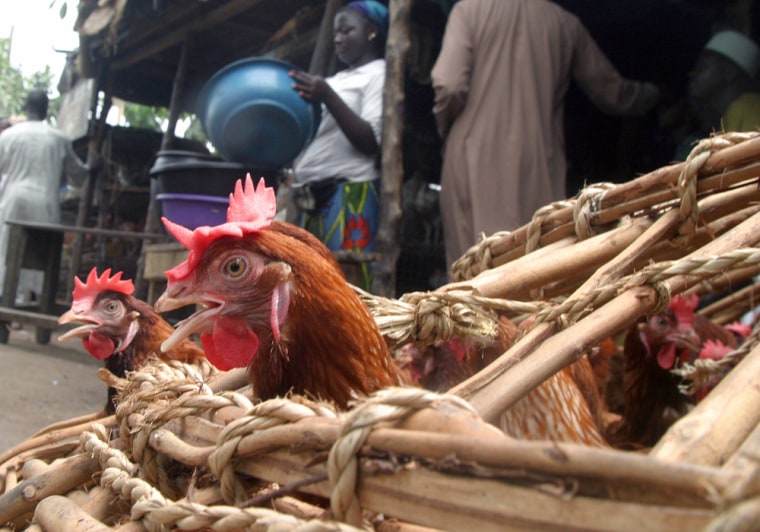The deadly H5N1 strain of bird flu has been found in two more Nigerian states, the Agriculture Ministry said Thursday, a day after the country reported the first known outbreak of the virus in Africa.
Nigeria quarantined bird farms throughout its north and neighboring countries banned poultry imports to try to halt the march of the virus on a poor continent little prepared to cope with an outbreak of the disease.
The head of the World Health Organization warned that health services across the region should be on high alert.
“The confirmation of H5N1 avian influenza in poultry in Africa is a cause for great concern and demands immediate action,” said WHO Director-General Dr. Lee Jong-wook. “The H5N1 virus now confirmed in Nigeria poses a risk to human health and livelihood.”
The first case, which was confirmed Wednesday, was detected at a large commercial farm in Kaduna state owned by the country’s sports minister, Saidu Samaila Sambawa, an Agriculture Ministry spokesman said.
The farm had a total of 46,000 chickens, geese and ostriches. About 40,000 of them died of bird flu and the other 6,000 were destroyed, according to the Paris-based World Organization for Animal Health, known as the OIE, citing Nigerian officials. The sports minister couldn’t be reached for comment.
Nigerian officials also said Thursday that bird flu had been confirmed at two farms in neighboring Kano state and one in neighboring Plateau state, Agriculture Ministry spokesman Tope Ajakaiye said.
On Monday, Nigerian officials had said preliminary tests on the deaths of some 60,000 farm-raised birds in Kano showed no trace of bird flu. Follow-up tests, however, confirmed the birds died of H5N1. No human infections have been reported in the country.
Nigeria ordered the quarantine and killing of any fowl suspected of carrying bird flu in hopes of halting its spread, officials said.
“The federal government is doing everything to contain the disease within the three centers that have been located,” Ajakaiye said in a statement.
Bird flu began ravaging poultry across Asia in 2003, forcing the slaughter of more than 100 million birds. The virus jumped to humans, and the WHO has confirmed 88 deaths from the disease.
Though all the people who contracted the disease so far are believed to have been infected through contact with sick birds, experts are concerned the disease could mutate into a form easily spread from human to human, potentially triggering a global pandemic.
More human infections reported in Asia
Indonesia said Thursday that two women from the same town have contracted the virus.
China said Wednesday that a 26-year-old woman had bird flu — the 11th known case in that country.
It was not clear how the virus made its way to Nigeria.
Juan Lubroth, a senior animal health officer at the Rome-based U.N. Food and Agriculture Organization, said experts suspected that Kaduna, where the disease was first reported, was “unlikely to have been the primary point of entry.” He said the initial confirmation merely indicated the fatal strain was in the area.
Bird farms across northern Nigeria, Africa’s most populous nation with 130 million people, are under quarantine, and a special assessment team traveled around the region Thursday, said Junaidu Maina, director of Nigeria’s livestock department. He did not say how many of Nigeria’s 36 states were under the quarantine order.
Neighboring Benin and Niger banned poultry imports from Nigeria Thursday and called on citizens to report any suspicious deaths among birds, either wild or domestic.
Cameroon, which earlier banned fowl imports from Europe when the virus was confirmed there, said veterinary officials were meeting to determine a course of action.
International experts from the FAO, the WHO and the OIE were expected in Nigeria on Friday, said Alex Thiermann of the World Organization for Animal Health in Paris.
Ian Slingenbergh, an FAO information officer, expressed concern about the difficulties in implementing the Nigerian measures.
“They require a lot of logistics, cooperation at both ministry level and with police who have to enforce movement restrictions for people in the streets.”
The United States pledged $25 million to help combat the spread of the virus and was sending a team from its Atlanta-based Centers for Disease Control and Prevention to help.
Sub-Saharan Africa, with about 600 million of the world’s poorest people, is particularly ill-equipped to deal with a major health crisis.
Countries like Uganda and Ethiopia don’t even have equipment to test for the strain and some villagers may be unaware of the disease’s threat.
